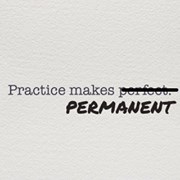Doctors’ Notes
BackPractice
Practice!
My daughter says it’s my favorite word. Maybe she’s just complaining about piano practice, but she has a point. As a parent, I do say it a lot.
Practice piano, practice spelling, practice saying “thank you,” practice keeping your lips shut when you chew. Practice talking to adults. Practice braiding your hair. Practice making a sandwich. Practice your cartwheels if you want to move to the next level in gymnastics.
Maybe it IS my favorite word.
 They say, of course, that practice makes perfect. But nothing is perfect, and my kid’s teacher has a better way of saying it: Practice makes permanent.
They say, of course, that practice makes perfect. But nothing is perfect, and my kid’s teacher has a better way of saying it: Practice makes permanent.
How perfect! I couldn’t agree more.
Because practice can go either way. If you try and try and try to do something right, you will improve. But if you repeatedly let yourself do something the wrong way — well, it can stick like that too.
This is clear when learning cursive or the violin, where practice is obvious and the results are too. We know intuitively that if we practice doing it wrong, we’ll develop bad habits that are hard to break. Isn’t it just less obvious, but even more important, in some of the less-concrete areas of life? In the ways we speak, for example, or in the ways we interact with others?
Childhood is the time when a person grows from nothing into something. And that growing is all about practice.
Consider the challenge of trying new foods, a common stressor of childhood. Many kids go through a phase of rejecting all but a few (“she
won’t eat anything but…”) foods. How do you fix it? Practice.
Because, of course, kids aren’t going to get it right on the first try. They’re not going to suddenly decide that mushrooms are tolerable, just because you say they should be. Touching them, eating them, and eventually enjoying them, all take practice.
So how do you practice? I say, start small. Sometimes, very small. On a molecular level, even. And maybe, like with the mushrooms, they don’t actually make it past the teeth at first. But keep trying, and you’ll get there.
Here I am when it’s time for one of my kids to practice piano: “Can you play the first note? Just the one note. It doesn’t even have to be with the correct finger. Heck, it doesn’t have to be with a finger at all. Play it with your chin. Yes! YES! You DID it! You did it so well, let’s do it again.”
And once she’s nailed that, we have a mini-party and immediately move on to the next challenge: playing the first TWO notes.
Master that, and call it a day. At least we’ll have something to start from tomorrow.
Some people might say, in parenting, that we only get one chance to raise a kid right. But I disagree.
How many days are there in parenting, and how many hours in each day? (And how many times to do we have to repeat ourselves before anyone pays attention?) Every new moment is a chance to do something right.
We, as parents, are practicing.
And that’s the beauty of practicing: we aren’t expected to get it right on the first try. Like everything, we get it wrong, we realize our mistakes, we try to fix them, and we try it again.
Sometimes we get it right on the second try, or the third, or maybe not until the fifteenth. Sometimes we never get it exactly right, But we are, hopefully, getting a teensy bit better every time. And along the way, we’re modeling to our children the best method there is of learning how to do everything there is that’s worth doing: Practicing.
Dr. Kerry McGee is a former Kids Plus provider.